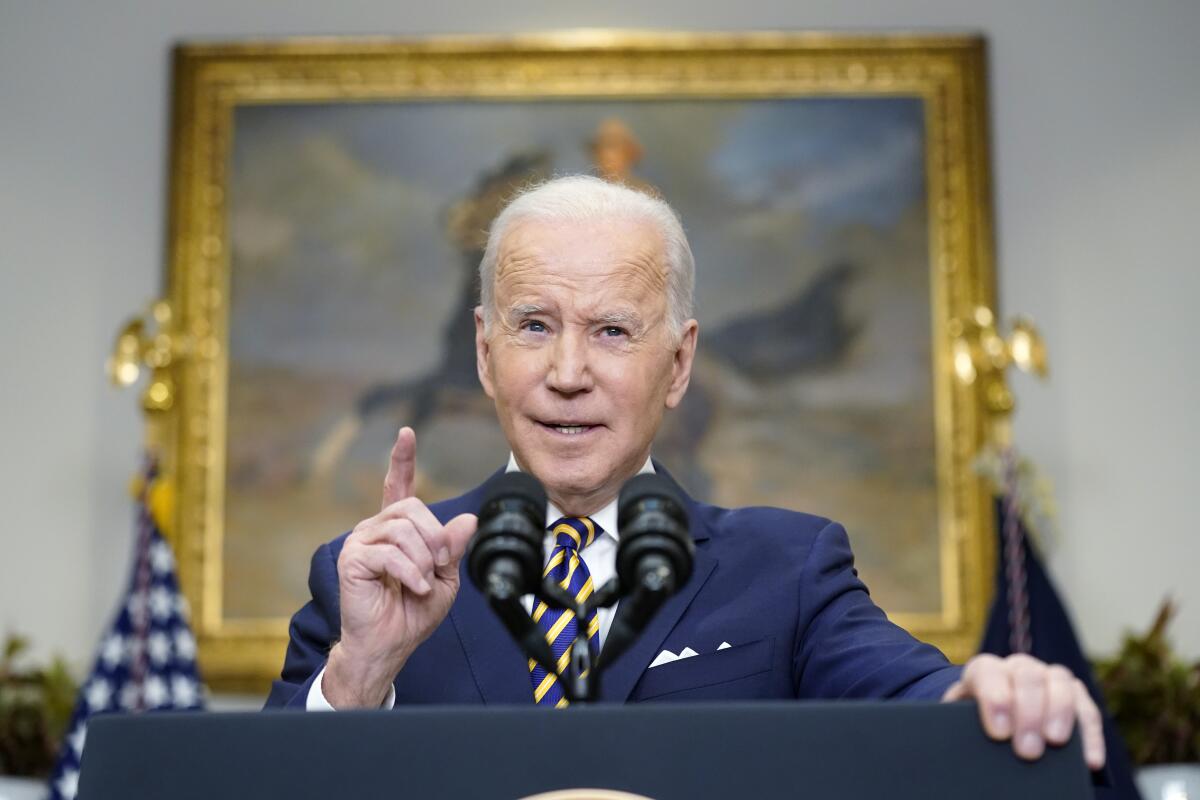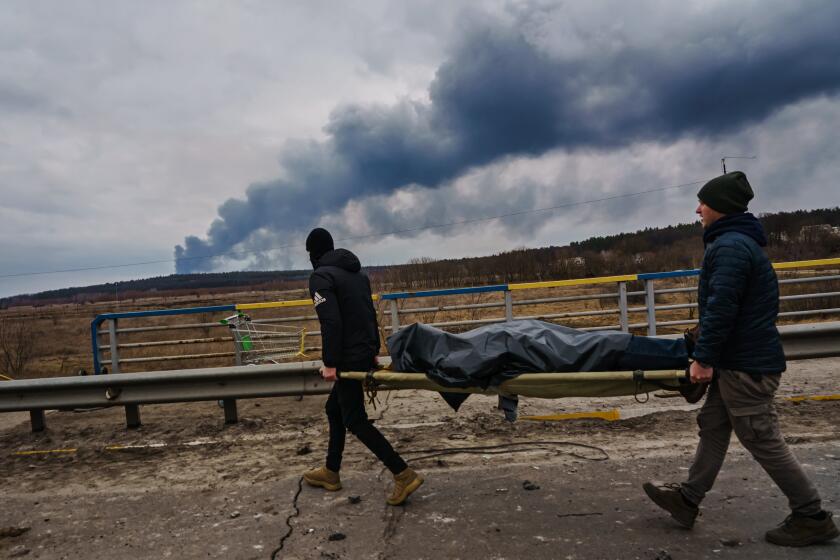Biden blocks Russian oil imports in latest round of sanctions on Kremlin

- Share via
WASHINGTON — President Biden announced on Tuesday that the U.S. will ban the importing of Russian oil, liquefied natural gas and coal, broadening the economic sanctions leveled against Moscow over its war in Ukraine.
The targeting of Russia’s most lucrative industry despite the likelihood of higher gasoline prices comes as bipartisan support in Congress has coalesced behind such restrictions and Europe has begun taking steps to reduce its imports of Russian energy products. The oil ban and other tough sanctions are being imposed by Western powers in the hopes of persuading Russian President Vladimir Putin to halt his all-out attack on the former Soviet republic.
“Russian oil will no longer be accepted at U.S. ports,” Biden said in a speech from the White House. “We will not be part of subsidizing Putin’s war.”
“Russia may continue to grind out its advance at a horrible price, but this much is already clear: Ukraine will never be a victory for Putin. Putin may be able to take a city. But he’ll never be able to hold the country,” Biden said, adding that the ban would target “the main artery of Russia’s economy.”
Biden’s action was welcomed by Ukrainian President Volodymyr Zelensky, who tweeted he was “thankful” the president had delivered a blow at “the heart of Putin’s war machine and banning oil, gas and coal from US market. Encourage other countries and leaders to follow.”
The White House had initially shrugged off calls to ban Russian oil, arguing that the impact on global markets would be destabilizing to the West. Administration officials had also said that deep economic sanctions were already hitting Moscow’s biggest banks and several oligarchs close to Putin, weakening the ruble and the nation’s economy broadly.
But Biden clearly warmed to the idea as support grew from Democrats and Republicans on Capitol Hill for a bipartisan bill to ban Russian energy, even as some Democrats worried that they would pay a political price in November’s midterm elections for public frustrations about high gas prices.
A no-fly zone to protect Ukraine from Putin’s bombs would involve complex ground operations and risk U.S.-Russian conflict and wider war in Europe.
It is the first time the U.S. has gotten ahead of its European allies in sanctioning Russia. Europe relies far more heavily on Russian energy imports and has been more reluctant to join in a ban. The U.S. imports around 700,000 barrels of oil a day from Russia, accounting for less than 10% of the nation’s energy supply. Europe imports more than 4 million barrels a day of Russian fuel.
But it appeared Europe’s reluctance was waning amid reports that the European Union and the U.K. will begin to dial down imports of Russian energy.
Britain will phase out imports of Russian oil and oil products — though not natural gas — by the end of the year, Prime Minister Boris Johnson said. The announcement came as Zelensky delivered an impassioned speech via video link to the British Parliament, where he received a boisterous standing ovation.
“Working with industry, we are confident that this can be achieved over the course of the year, providing enough time for companies to adjust and ensuring consumers are protected,” Johnson said in a statement.
Residents trying to leave Sumy and Mariupol are part of the exodus from Ukraine. But will sanctions stop Putin? Poland stuns U.S. with plane offer.
Though less forward-leaning, the European Commission announced plans to slash EU dependence on Russian natural gas by as much as two-thirds this year and “end reliance” on Russian fossil fuels before 2030. Russia supplies roughly 40% of the 27-nation bloc’s gas. The EU is seeking alternative sources and cleaner energy.
German Chancellor Olaf Scholz said a full ban is “premature,” although he has already taken the extraordinary step of halting certification of the Nord Stream 2 gas pipeline between Russia and Germany’s Baltic Coast, a venture Putin had long sought to increase his leverage over Europe’s energy resources.
“The U.S. ban is largely symbolic because Russian crude is a replaceable crude for us,” said Diane Munro, a longtime oil market analyst who noted that imports from Iraq, Canada and the country’s strategic reserve can offset the loss of Russian oil. “Europe can’t really take the same step without trashing the global market.”
Despite Russian oil’s relatively small role in the domestic market, banning it could lead to higher prices at the pump in the U.S. Gasoline is already averaging $4 a gallon nationwide, up from $2.77 a year ago, according to AAA. The average price of gas in California during that same period has risen from $3.75 to $5.34.
Biden acknowledged the new ban will be felt in Americans’ wallets but warned U.S. oil companies against taking advantage of the crisis.
“It’s no excuse to exercise excessive price increases or padding profits or any kind of effort to exploit the situation,” he said in a message aimed at energy executives. “It is not time for profiteering or price gouging.”
Until now, the economic strangulation of Russia by the West over its unprovoked invasion of Ukraine has avoided its robust energy sector. But as Russia increases its unrelenting bombardment of Ukrainian cities, political pressure on the West has grown to do more to put pressure on Putin to stop the onslaught. U.S. officials said the Biden administration is also considering easing restrictions on imports of oil from Venezuela to alleviate the void left by Russian oil bans, a politically problematic step.
Hundreds of thousands of people seek to flee Ukrainian cities under heavy assault by Russia. The Pentagon sends 500 more U.S. troops to Europe.
Since the Obama administration, Washington has been sanctioning Venezuela and blacklisting senior Venezuelan officials because of human rights abuses and the trampling of democracy there. President Trump broke diplomatic ties with Caracas. But Venezuela sits on one of the world’s largest reserves of oil, exploitation of which the sanctions have helped to curb.
Biden’s announcement Tuesday did not mention Venezuela or other alternative sources of crude. He did say, however, that he hopes the Ukraine war leads to an accelerated transition to clean energy.
It is in that area where bipartisan support will flag. Many Republicans advocate reopening environmentally sensitive U.S. parks and ocean beds to drilling. Meanwhile, Democrats have been pushing to reduce U.S. reliance on fossil fuels.
For now, though, Democrats and Republicans are speaking in similar terms. The administration was facing pressure to enact an oil ban before Congress took action. Members of both political parties have introduced bills in both houses to block such imports.
Despite Biden’s announcement, the House is still expected to vote on legislation to impose the Russian oil ban, House Speaker Nancy Pelosi (D-San Francisco) told Democrats in a closed-door meeting Tuesday, according to a Democratic aide. The legislation is also expected to include other measures.
Pelosi told Democrats that she had been alerted by the White House days ago that Biden would announce the oil ban.
Congress is weighing an oil ban as it pushes to pass a measure to send Ukraine billions of dollars in emergency assistance. Senate Majority Leader Charles E. Schumer (D-N.Y.) on Monday called for passage of a $12-billion aid package this week, saying it “will provide both humanitarian and military assistance for Ukraine: funding for refugees, medical supplies, emergency food supplies, as well as funding to support weapons transfers into Ukraine, and help for our eastern flank NATO allies.”
In a letter to House Democrats on Sunday, Pelosi said Congress intended to pass $10 billion in emergency aid for Ukraine as part of a larger government funding measure. The House is also exploring legislation that would “further isolate” Russia from the world economy, Pelosi said.
Times staff writer Jennifer Haberkorn in Washington contributed to this report.
More to Read
Get the L.A. Times Politics newsletter
Deeply reported insights into legislation, politics and policy from Sacramento, Washington and beyond. In your inbox twice per week.
You may occasionally receive promotional content from the Los Angeles Times.















